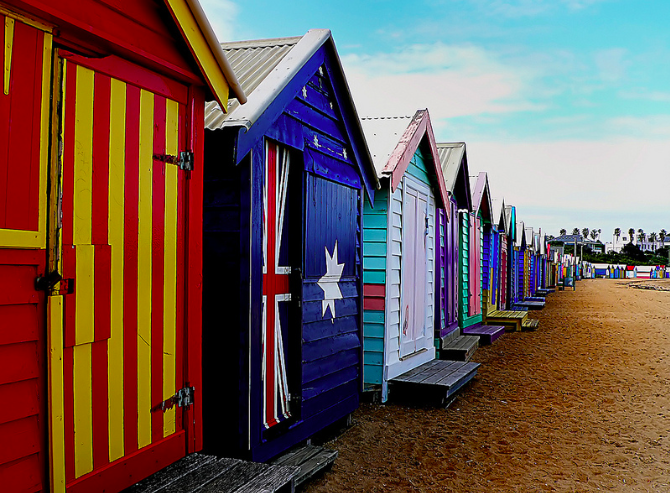I’m Australian, not Austrian but please let me in on the EU. There are marked differences between the two countries, not least of which is that Australia is an island continent 14,000 kilometres away from Europe. However, this geographic logic did not stop Australia joining the Eurovision song contest in 2015. Indeed, Australia fully embraced Eurovision but the country seems much more reticent to participate in matters of international politics. I concede that Australia will never become an EU Member, nor would this actually be appropriate given the geography. However, by considering the Australian consequences of not being a part of such a body, this article illustrates how an EU model would be of significant value in addressing the issues facing the international community.

The benefits of EU Membership are pertinent to consider at a time when another contest about the ‘Euro[pean] vision’ is playing out on a much broader stage in European and international politics. Underpinning the EU is the idea that international cooperation is both necessary and beneficial for economic, political and security purposes. In reality it might not achieve these ends, be efficient or even be understandable. However what makes it different from other international bodies that share similar goals is that the EU remains unique in its authority over its members. This perceived relinquishment of individual state autonomy has contributed to the momentum of Euro-skepticism. However, it is necessary to consider how this also provides an important strength. This can be seen by comparing the Australian and EU responses to the pressing issues of climate change and the human rights treatment of refugees and asylum seekers.
Climate change poses a very real threat to the globe and its effects have no respect for national boundaries. It is recognised that strong, international action is required to address it. However, without effective and binding frameworks that encourage shared responsibility, this is difficult to achieve.
Australia has been accused of withdrawing from international cooperation on the issue, favouring unilateral action instead. This came after Australian Prime Minister Tony Abbott removed climate change from the topics of discussion at the 2014 G20 conference hosted in Brisbane and repealed a tax on carbon emissions. Even if unilateral action was enough it still requires action. Australia had designed an Emissions Trading Scheme (ETS) in 2007, and many other countries now also have variations of an ETS including the EU. However in Australia, it never passed. Domestic political tensions meant that it was dropped off the agenda along with the prime minister who suggested it. The reasons for back-pedalling on environmental protection measures were primarily economic: to introduce an ETS would have put Australia at a comparative market disadvantage with its regional trading partners. Taking action on climate change has therefore been equated with being detrimental to national industry.
The EU model with its single market and ability to pass binding resolutions is in a better position to guarantee action and share responsibility, at the very least it can hold conversations about the issue with its members. Under the European Climate Change Programme (ECCP) the EU has implemented an ETS and is on track to meet a 20% reduction in emissions by 2020. In addition to the EU wide policies member states have established domestic programs that complement or extend their international and european commitments. Sweden for example has committed to having no net GHG emissions by 2050. Where EU energy law is not respected the EU Commission can begin enforcement procedures calling for compliance through the European Court of justice.
International commitments such as the Paris Agreement are also an important form of international cooperation but perhaps are still not enough. International law is often said to be ‘non-binding’. International convention relies on the fact that the embarrassment and reaction of respective parties will be enough to encourage the compliance of the other. The problem in Australia is that this is apparently not motivating enough.
Enter Australia’s refugee and asylum seeker system. For human rights to be meaningful they need to be respected regardless of domestic political agendas. However, the framework of international law makes it difficult to ensure this happens as incorporation into domestic law is at the behest of individual nations. The importance of recognition at law of rights is crucial. Members of the EU must, at least on paper, domestically incorporate the European Convention on Human Rights, which is accountable to the European Court of Human Rights. This can be contrasted to the position in Australia where there is little legal protection of rights.
The mechanisms used to process and treat asylum seekers is increasingly becoming a challenge especially in Europe. This is because the numbers of people coming are overwhelming existing and imagined systems. It appears that the bigger the problem the more tempting to implement harsher, sweeping and dehumanising policies. It is vital that whatever approaches are adopted across Europe, that they uphold human rights. At the moment there is some guarantee of this occurring. The scale of the issue in Australia is markedly less, yet extremely harsh measures have been implemented to achieve a deterrence based system. Adopting this ‘stop the boats’ policy, that is not subject to domestic or binding international human rights protections, has resulted in multiple findings of human rights breaches by the UN and other organisations and the harm continues. The Australian system detains Illegal Maritime Arrivals (IMAs) on offshore processing centres and settlement in Australia will never be an option for those who arrived ‘illegally’ by boat. Upon the release of a report finding human rights abuses against torture, then Prime Minister Tony Abbott simply said Australians were ‘sick of being lectured to by the UN’.
International cooperation is always going to be difficult where domestic interests have to be balanced against each other. However, its pursuit is still necessary and worthy precisely because if left to domestic political interests the action and responsibility sharing required to deal with the issues of the 21st century is undermined and the results are ugly. Australia provides a case example of the dangers of not being involved, so whilst the EU might not be perfect it should not be abandoned.
Taminka Hanscamp
Image 1: Bernard Spragg, Public Domain
Image 2: Naomi Wolfers, Instagram







